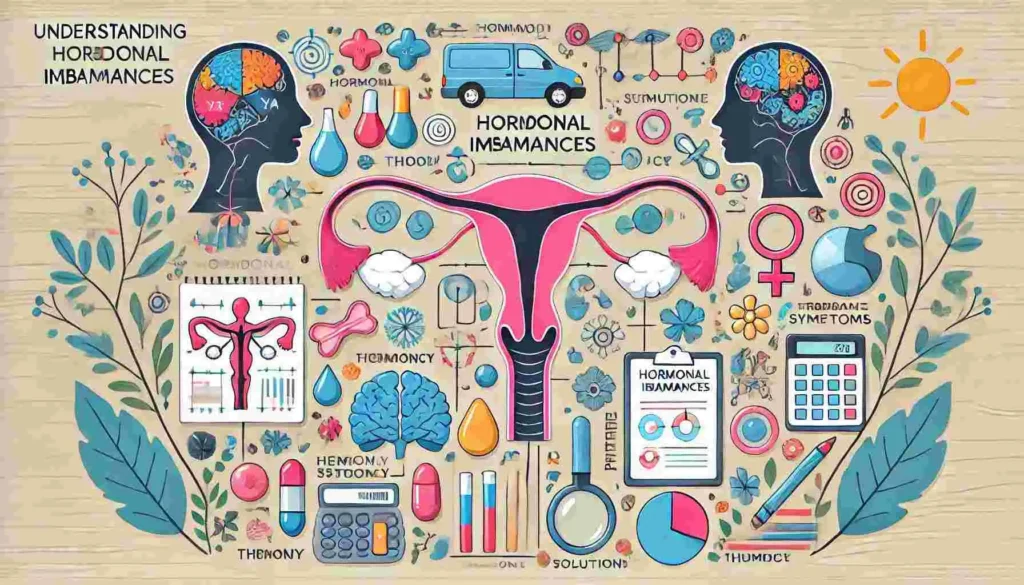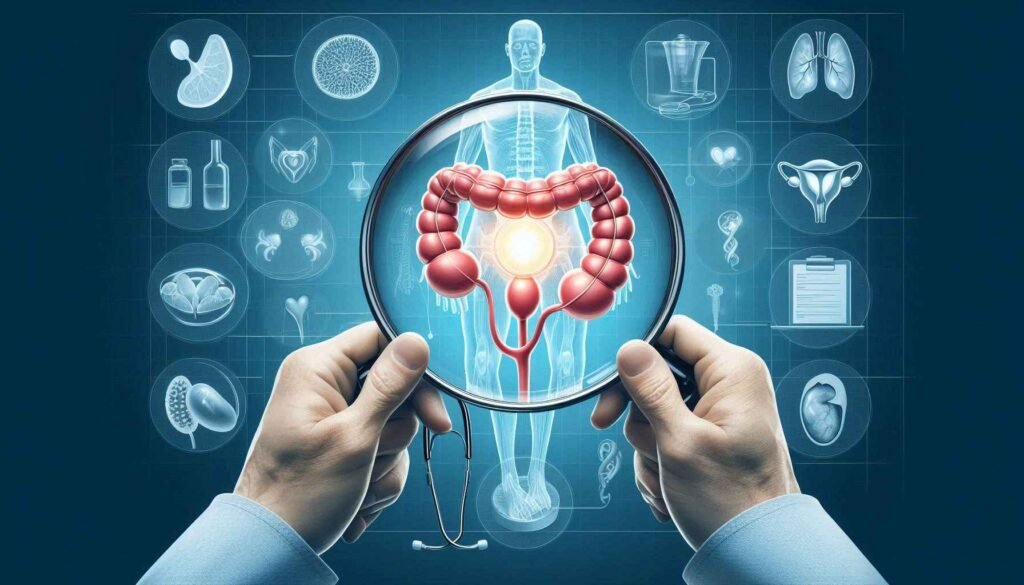
Understanding Hormonal Imbalances: Causes, Symptoms, and Solutions
What Are Hormones, and Why Are They Important?
Hormones are chemical messengers that travel through your bloodstream to tissues and organs, helping to regulate many bodily functions. These include growth and development, metabolism, sexual function, and mood. Some of the most important hormones in the body include:
- Insulin: Regulates blood sugar levels.
- Thyroid hormones (T3 and T4): Control metabolism and energy levels.
- Estrogen and progesterone: Regulate the female reproductive system and menstrual cycles.
- Testosterone: Controls male reproductive functions, muscle mass, and mood.
- Cortisol: Helps your body respond to stress.
- Adrenaline: Involved in the body’s fight-or-flight response.
A balance of these hormones is essential for overall health, and even small fluctuations can have a noticeable impact.
Causes of Hormonal Imbalances
Hormonal imbalances can be caused by a variety of factors, ranging from lifestyle choices to underlying medical conditions. Identifying the root cause is essential for treating hormonal imbalances effectively. Here are some common causes:
1. Diet and Lifestyle Factors
What you eat, how you manage stress, and your daily habits all play a role in maintaining hormonal balance. Poor diet, lack of exercise, inadequate sleep, and chronic stress can all contribute to hormonal disruptions. For example:
- Unhealthy diets: Diets high in processed foods, sugars, and unhealthy fats can interfere with hormone production, leading to insulin resistance or thyroid dysfunction.
- Chronic stress: High levels of stress increase cortisol levels, which can impact other hormones and lead to conditions like adrenal fatigue.
- Lack of sleep: Poor sleep disrupts the body’s natural hormone cycles, particularly those related to hunger and stress management.
2. Age and Life Stages
Hormonal imbalances are often linked to various life stages, especially during puberty, pregnancy, and menopause.
- Puberty: The onset of puberty brings a surge in sex hormones like estrogen, progesterone, and testosterone. This is the period when many adolescents experience hormonal changes that affect their mood, skin, and physical growth.
- Pregnancy: Pregnancy is a time of significant hormonal changes as the body prepares to support a growing fetus. Hormonal fluctuations during pregnancy can cause symptoms like morning sickness, mood swings, and changes in skin and hair.
- Menopause: During menopause, women experience a dramatic decrease in estrogen levels, which can lead to hot flashes, night sweats, mood swings, and other symptoms.
- Perimenopause: The phase leading up to menopause, known as perimenopause, is often characterized by irregular menstrual cycles and fluctuating hormone levels.
3. Polycystic Ovary Syndrome (PCOS)
PCOS is a common endocrine disorder that affects women of reproductive age. It causes hormonal imbalances that can lead to symptoms like irregular periods, excessive hair growth, acne, and weight gain. The condition is also linked to insulin resistance, making it a significant risk factor for type 2 diabetes.
4. Thyroid Disorders
The thyroid gland plays a crucial role in regulating metabolism. Disorders of the thyroid, such as hypothyroidism (underactive thyroid) and hyperthyroidism (overactive thyroid), can cause a wide range of symptoms, including fatigue, weight gain or loss, mood swings, and changes in skin and hair. Hypothyroidism, in particular, is one of the most common hormonal imbalances in women.
5. Medications and Birth Control
Certain medications, especially hormonal birth control methods, can disrupt the natural balance of hormones in the body. Birth control pills, implants, and patches contain synthetic hormones that can alter your body’s normal hormone levels. Medications like steroids and hormone replacement therapy (HRT) also impact hormone production and regulation.
6. Environmental Toxins
Exposure to environmental toxins, such as pesticides, plastics, and chemicals in personal care products, can affect the endocrine system. These chemicals, known as endocrine disruptors, can mimic or interfere with natural hormones, leading to imbalances. For example, BPA (Bisphenol A), found in some plastics, is a known endocrine disruptor that has been linked to reproductive issues.
Symptoms of Hormonal Imbalances
The symptoms of hormonal imbalances can vary greatly depending on which hormones are affected and the severity of the imbalance. However, some common signs that you might be dealing with a hormonal imbalance include:
1. Irregular Menstrual Cycles
Changes in the length of your menstrual cycle or skipped periods are often one of the first signs of a hormonal imbalance in women. This could be due to conditions like PCOS, thyroid dysfunction, or perimenopause.
2. Fatigue and Low Energy
Chronic fatigue is one of the most common complaints associated with hormonal imbalances. If your thyroid, adrenal glands, or other hormone-producing systems are not functioning optimally, you may feel constantly tired, regardless of how much sleep you get.
3. Mood Swings and Anxiety
Hormonal fluctuations can significantly impact your mood. Women with hormonal imbalances may experience irritability, mood swings, or increased anxiety. This is particularly common during PMS, perimenopause, and menopause.
4. Weight Gain or Difficulty Losing Weight
Hormonal imbalances can lead to weight gain or difficulty losing weight. Insulin resistance, thyroid dysfunction, and cortisol imbalances can all contribute to unwanted weight changes. Additionally, fluctuations in estrogen levels can affect fat distribution in the body.
5. Acne and Skin Issues
Excessive production of certain hormones, such as testosterone, can lead to acne, oily skin, and other skin issues. Hormonal imbalances are one of the leading causes of adult acne, especially in women during their menstrual cycle or during pregnancy.
6. Sleep Disturbances
Hormonal imbalances, particularly in cortisol and melatonin, can interfere with your sleep patterns. Elevated cortisol levels, caused by chronic stress, can make it difficult to fall asleep or stay asleep, leading to poor sleep quality.
Solutions for Hormonal Imbalances
Addressing hormonal imbalances involves a combination of lifestyle changes, medical interventions, and sometimes hormone therapy. Here are some effective solutions to help restore balance to your hormones:
1. Dietary Changes
Eating a balanced diet rich in whole foods, healthy fats, and fiber can help regulate hormone levels. Focus on nutrient-dense foods such as:
- Healthy fats: Avocados, nuts, seeds, and olive oil support hormone production.
- Cruciferous vegetables: Broccoli, kale, and Brussels sprouts help detoxify excess estrogen.
- Protein: High-quality protein sources like chicken, fish, and legumes can help regulate blood sugar and insulin levels.
- Fiber: Whole grains, fruits, and vegetables help support digestive health and prevent insulin resistance.
2. Exercise and Stress Management
Regular exercise helps reduce cortisol levels and maintain a healthy weight, which is crucial for hormonal balance. Engaging in activities like yoga, Pilates, or walking can also help reduce stress and promote relaxation, improving hormone regulation.
3. Sleep Optimization
Prioritize getting 7-9 hours of quality sleep each night to support hormone health. Create a sleep-friendly environment by keeping your bedroom dark, cool, and quiet, and establish a bedtime routine to signal to your body that it’s time to wind down.
4. Consider Natural Supplements
Certain supplements, such as magnesium, vitamin D, and omega-3 fatty acids, can support hormone regulation. Herbal supplements like ashwagandha, maca root, and vitex (chaste tree berry) have also been shown to help balance hormones in some individuals.
5. Consult with a Healthcare Professional
If you suspect a hormonal imbalance, it’s essential to consult with a healthcare professional. They may recommend blood tests to check your hormone levels and suggest a personalized treatment plan. For more severe imbalances, hormone replacement therapy (HRT) or medications may be prescribed.
Hormonal imbalances can often feel overwhelming and frustrating, but with the right approach, they can be managed effectively. After understanding the causes and symptoms, it’s time to explore some of the most effective solutions to restore balance and improve overall health. Whether through lifestyle changes, medical interventions, or natural remedies, there are many ways to address and manage hormonal imbalances.
Medical Interventions for Hormonal Imbalances
If you suspect you have a hormonal imbalance, it’s important to consult a healthcare provider for a proper diagnosis and treatment plan. Hormonal imbalances can sometimes be more complex than simple lifestyle changes can resolve. Here are some common medical treatments that might be recommended:
1. Hormone Replacement Therapy (HRT)
For those experiencing imbalances due to menopause, perimenopause, or other conditions like hypothyroidism, hormone replacement therapy (HRT) may be prescribed. HRT involves supplementing the body with hormones such as estrogen, progesterone, or thyroid hormones to bring hormone levels back into balance. It can be highly effective for alleviating symptoms like hot flashes, night sweats, mood swings, and vaginal dryness.
However, it’s important to weigh the potential risks and benefits of HRT, as some studies have linked long-term use to an increased risk of certain cancers, stroke, and heart disease. Your healthcare provider will help determine if HRT is the right treatment for your situation.
2. Medications for Thyroid Imbalances
For those with thyroid imbalances, medications can help restore normal thyroid function. Hypothyroidism (underactive thyroid) is commonly treated with synthetic thyroid hormones, such as levothyroxine, to replace the hormones the thyroid is not producing. For hyperthyroidism (overactive thyroid), medications like methimazole or propylthiouracil can reduce the production of thyroid hormones.
Thyroid conditions may also require periodic blood tests to monitor hormone levels and adjust the medication dosage as needed.
3. Birth Control Pills for Hormonal Regulation
For women with hormonal imbalances related to menstruation, PCOS, or irregular cycles, birth control pills can help regulate hormone levels. Birth control pills contain synthetic hormones that mimic the natural hormonal fluctuations in the menstrual cycle. These pills can help balance estrogen and progesterone levels, reducing symptoms like acne, excessive hair growth, and heavy or irregular periods.
However, birth control pills are not a permanent solution and may come with side effects, including mood changes, weight gain, or blood clot risks. Be sure to discuss these potential risks with your doctor.
4. Anti-Androgens for PCOS
Women with PCOS often have higher levels of androgens (male hormones) such as testosterone, which can lead to symptoms like acne, facial hair, and thinning hair. Anti-androgens such as spironolactone are used to block the effects of testosterone. These medications can help restore hormonal balance and improve the symptoms of PCOS, particularly those related to skin and hair.
While effective, anti-androgens can take several months to show results and may need to be used in combination with other treatments for optimal results.
5. Insulin-Sensitizing Medications for PCOS and Insulin Resistance
PCOS is often associated with insulin resistance, which can contribute to weight gain and increase the risk of type 2 diabetes. Medications like metformin are commonly prescribed to help improve insulin sensitivity. These medications work by reducing insulin levels, which can help regulate hormone levels, reduce symptoms of PCOS, and support weight management.
Metformin is also used for individuals with prediabetes or diabetes, and it can play a critical role in managing hormone-related issues linked to insulin resistance.
Lifestyle Solutions to Manage Hormonal Imbalances
In addition to medical treatments, lifestyle changes are essential for managing hormonal imbalances. These changes may help regulate hormone production, reduce symptoms, and improve overall well-being. By adopting healthier habits, you can make a significant impact on your hormonal health.
1. Eating a Balanced, Hormone-Friendly Diet
A healthy diet is one of the most effective ways to manage hormonal imbalances. Certain foods are known to support hormone production and balance, while others can exacerbate hormonal issues. Here are some dietary guidelines to follow:
- Consume plenty of fiber: Foods like whole grains, vegetables, and fruits are rich in fiber, which helps regulate insulin levels and support healthy digestion. Fiber can also help remove excess estrogen from the body, reducing the risk of hormone-related conditions.
- Prioritize healthy fats: Omega-3 fatty acids, found in foods like fatty fish, flaxseeds, and walnuts, are essential for hormone production. Healthy fats also help reduce inflammation and support the function of the endocrine system.
- Avoid refined sugars and processed foods: High sugar intake can lead to insulin resistance, which contributes to hormonal imbalances. Processed foods can also increase inflammation in the body, making it harder for hormones to function properly.
Incorporating these healthy foods into your daily meals can help restore balance and improve symptoms of hormonal imbalances.
2. Stress Management and Cortisol Control
Chronic stress is one of the leading causes of hormonal imbalances, particularly when it comes to cortisol, the body’s primary stress hormone. Prolonged high cortisol levels can negatively affect other hormones, leading to weight gain, fatigue, anxiety, and sleep disturbances.
To manage stress, try incorporating relaxation techniques into your routine, such as:
- Mindfulness meditation: A practice that helps calm the mind and reduce stress levels.
- Deep breathing exercises: These can help lower cortisol levels and promote relaxation.
- Physical activity: Regular exercise is an effective way to reduce stress and boost endorphins, the body’s natural mood lifters.
- Adequate sleep: Sleep is essential for hormone regulation, so aim for 7-9 hours of sleep each night.
By incorporating stress-reducing activities into your lifestyle, you can help manage cortisol levels and restore hormonal balance.
3. Regular Exercise to Boost Hormonal Health
Exercise plays a vital role in managing hormonal imbalances. Physical activity helps regulate hormones such as insulin, estrogen, and testosterone, and it also supports healthy metabolism and weight management. Whether it’s cardio, strength training, or yoga, regular exercise can help:
- Reduce insulin resistance: Exercise improves insulin sensitivity, which helps regulate blood sugar and reduce the risk of developing diabetes or metabolic syndrome.
- Boost mood and energy levels: Exercise helps improve mood by releasing endorphins, which can reduce symptoms of anxiety and depression.
- Support weight management: Exercise is a key factor in maintaining a healthy weight, which is essential for hormonal balance.
Aim for at least 150 minutes of moderate-intensity exercise per week, combined with strength training twice a week, for optimal hormonal health.
4. Getting Enough Sleep
Sleep is crucial for hormone regulation, as it allows the body to repair and reset itself. Lack of sleep or poor-quality sleep can interfere with hormone production, particularly hormones involved in hunger (ghrelin and leptin), stress (cortisol), and growth (growth hormone).
To improve sleep quality:
- Establish a consistent sleep schedule: Going to bed and waking up at the same time every day helps regulate the body’s internal clock and hormone production.
- Create a sleep-friendly environment: Keep your bedroom dark, quiet, and cool to create the ideal sleep setting.
- Limit screen time before bed: Avoid electronic devices at least an hour before bed, as the blue light emitted can interfere with melatonin production, the hormone responsible for regulating sleep.
5. Herbal Remedies and Supplements
In addition to lifestyle changes, certain herbs and supplements can help support hormone balance. Some of the most commonly used natural remedies include:
- Ashwagandha: Known for its ability to reduce stress and regulate cortisol levels.
- Maca root: Often used to support hormonal balance, particularly during menopause.
- Vitex (chaste tree berry): Known for its ability to balance estrogen and progesterone levels, often used for PMS and irregular periods.
- Omega-3 fatty acids: Help reduce inflammation and support overall hormone production.
Before starting any new supplements or herbal treatments, it’s important to consult with a healthcare provider to ensure they are safe and effective for your specific needs.
Managing hormonal imbalances effectively involves a holistic approach, combining medical treatments, lifestyle modifications, and natural remedies. In the third and final part of this blog post, we will explore the long-term strategies and practical steps you can take to maintain hormone balance and promote overall health. We’ll also dive deeper into the importance of monitoring your progress and adjusting your approach as needed.
The Importance of Ongoing Monitoring and Professional Guidance
Hormonal imbalances can be complex and may require ongoing attention to ensure that the treatments or lifestyle changes are having the desired effect. Consulting with healthcare professionals who understand your condition and symptoms is crucial for long-term success. Here’s why continuous monitoring and professional guidance are vital:
1. Regular Hormone Testing
Hormonal levels fluctuate naturally throughout the day, the menstrual cycle, and even with age. Regular hormone testing, through blood or saliva samples, can provide insight into what’s happening inside your body. This is especially important for those with conditions like thyroid disorders, PCOS, or menopause.
Testing your hormones can help:
- Identify imbalances: Regular tests can show whether certain hormones are too high or low, allowing your doctor to make adjustments to your treatment plan.
- Track progress: Hormone levels can change over time, so periodic tests help track improvements or signs that further treatment may be necessary.
- Personalize treatment: The results of hormone testing allow doctors to recommend more targeted interventions, such as adjusting medications or supplements.
By keeping track of your hormone levels, you can ensure that your treatment plan is working, and make necessary adjustments as needed. Speak with your doctor about how often you should be tested for your specific hormonal condition.
2. Follow-Up Appointments
It’s not enough to visit your healthcare provider once and then forget about the issue. Follow-up appointments are essential to assess the effectiveness of treatments. Whether you are on hormone replacement therapy, taking medications like birth control or metformin, or following a natural supplementation regimen, regular check-ins help maintain optimal hormone balance.
At these appointments, your doctor can:
- Evaluate treatment success: Assess how you’re feeling and if your symptoms have improved.
- Make adjustments: Modify your treatment plan if necessary, based on test results and feedback from you.
- Prevent future imbalances: Discuss preventative measures or lifestyle changes to avoid hormonal disruptions in the future.
By maintaining consistent communication with your healthcare provider, you will have better control over your hormone health in the long run.
3. Customized Nutritional Plans
If you suffer from a hormonal imbalance, working with a registered dietitian or nutritionist to create a personalized meal plan can be incredibly beneficial. A tailored nutritional plan ensures you’re consuming the right foods to support your hormones and overall health.
A customized plan may include:
- Targeted nutrient intake: A dietitian will focus on foods that promote hormone balance, such as healthy fats, fiber, and protein.
- Identifying food sensitivities: Sometimes, certain foods can worsen hormonal imbalances, like dairy or gluten. A nutritionist can help you identify and avoid these triggers.
- Supplement recommendations: In some cases, dietary supplements may be suggested to boost specific hormones or prevent deficiencies. These could include magnesium, vitamin D, or omega-3 fatty acids.
The key is to work with a professional who can guide you in making dietary choices that fit your hormonal needs.
Natural Remedies for Hormonal Imbalances
In addition to medical interventions and lifestyle changes, many people turn to natural remedies to support hormone balance. Natural treatments, such as herbs, essential oils, and other holistic therapies, can work alongside medical treatments to help alleviate symptoms and restore equilibrium. Here are some effective natural remedies that might help:
1. Herbal Supplements for Hormonal Health
Several herbs are known to support hormonal balance, and they have been used for centuries to treat hormone-related issues. Some commonly used herbs include:
- Ashwagandha: An adaptogen that helps the body cope with stress and balance cortisol levels. It also supports the thyroid and adrenal glands.
- Maca Root: Known for balancing estrogen and progesterone levels, maca is often used to improve symptoms of menopause and PCOS.
- Vitex (Chaste Tree Berry): This herb is particularly useful for balancing progesterone and estrogen levels and is often used to treat symptoms of PMS, perimenopause, and irregular cycles.
- Evening Primrose Oil: Rich in essential fatty acids, this oil is used to alleviate symptoms of PMS and menopause by helping to balance estrogen levels.
Before incorporating these herbs into your routine, it’s essential to consult with a healthcare professional to ensure they are safe and effective for your specific needs.
2. Essential Oils for Hormonal Balance
Essential oils can be a powerful tool for managing hormonal imbalances. When used in aromatherapy or topically (when diluted with a carrier oil), these oils can help support the body’s natural hormone production. Some essential oils known for promoting hormone balance include:
- Clary Sage: Known to help balance estrogen levels, clary sage is especially useful for women experiencing symptoms of menopause or PMS.
- Lavender: This oil is known for its calming effects and can help reduce stress and anxiety by lowering cortisol levels. It can also improve sleep quality, which is essential for hormone regulation.
- Geranium: Often used to balance hormones and promote emotional well-being, geranium is helpful for regulating menstrual cycles and reducing mood swings.
- Peppermint: Known for its ability to boost energy levels, peppermint can also support digestive health, which is vital for hormone regulation.
Using essential oils as part of a daily self-care routine can help promote emotional balance, reduce stress, and support the body’s natural processes.
3. Acupuncture for Hormonal Health
Acupuncture, a form of traditional Chinese medicine, involves inserting thin needles into specific points on the body to stimulate energy flow and restore balance. Many studies suggest that acupuncture can be an effective treatment for hormonal imbalances, particularly in cases related to menstrual irregularities, fertility, and stress.
Acupuncture works by:
- Balancing the endocrine system: By stimulating certain points, acupuncture can help balance hormone production, particularly for thyroid, adrenal, and reproductive hormones.
- Reducing stress: Acupuncture has been shown to reduce cortisol levels, which can help manage the impact of chronic stress on hormone balance.
- Improving blood circulation: This can help regulate hormone levels and promote better overall health.
If you are interested in acupuncture, it’s important to find a licensed and experienced practitioner to guide you through the treatment process.
Long-Term Strategies for Maintaining Hormonal Health
While short-term treatments are essential for restoring hormonal balance, it’s equally important to develop long-term strategies to maintain that balance and prevent future imbalances. Here are a few tips to keep your hormones in check for the long haul:
1. Stay Consistent with Healthy Habits
Once you’ve developed a routine that supports your hormonal health—whether it’s diet, exercise, or stress management—it’s essential to stay consistent. Making healthy choices a part of your daily life will provide long-term benefits, including balanced hormones, improved energy, and reduced risk of chronic conditions.
2. Prioritize Self-Care
Self-care is about taking time for activities that nourish both your body and mind. Whether it’s meditation, journaling, spending time outdoors, or enjoying a hobby, prioritizing your mental and emotional health is essential for maintaining hormonal balance. Stress is a major disruptor of hormones, so taking time to relax and unwind will help prevent imbalances from recurring.
3. Adapt as You Age
As your body changes with age, so do your hormonal needs. Menopause, perimenopause, and the natural aging process bring new challenges, but with the right approach, you can continue to maintain hormonal balance. Be proactive in adjusting your lifestyle, seeking support from healthcare professionals, and embracing the changes that come with each stage of life.
Conclusion: Empowering Yourself to Take Control of Your Hormonal Health
Hormonal imbalances can affect almost every aspect of your life, from mood to metabolism. However, with the right understanding, treatments, and lifestyle adjustments, you can regain control and live a healthy, balanced life. Whether you choose medical interventions, natural remedies, or a combination of both, it’s important to stay informed, track your progress, and make adjustments as needed.
By incorporating stress management techniques, prioritizing sleep, eating a hormone-friendly diet, and maintaining a consistent exercise routine, you’ll support your body’s natural hormonal rhythms. And with professional guidance and monitoring, you’ll ensure that any imbalances are addressed promptly and effectively.
Taking a proactive approach to your hormonal health will not only improve your current symptoms but will also set you up for long-term well-being. Trust in your ability to manage and restore balance to your body, and take the steps that are right for you. Remember, you have the power to feel better and live healthier—starting today.



